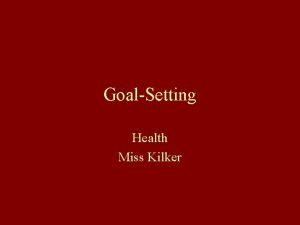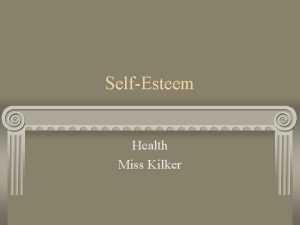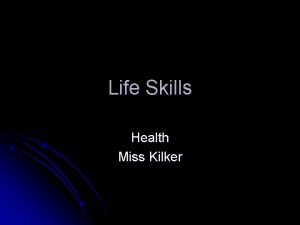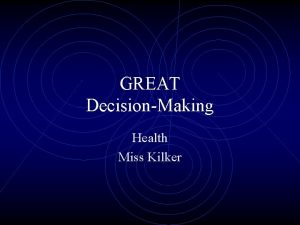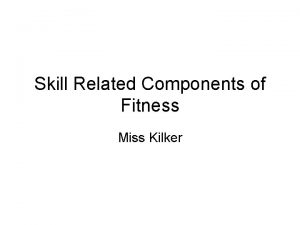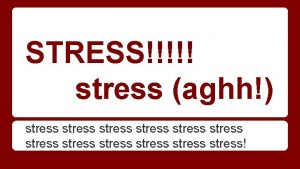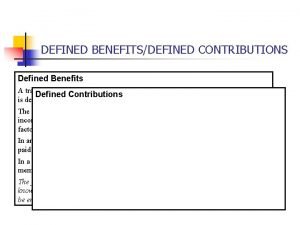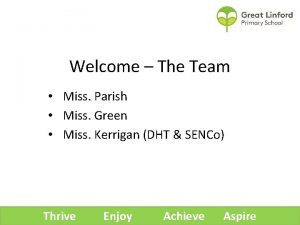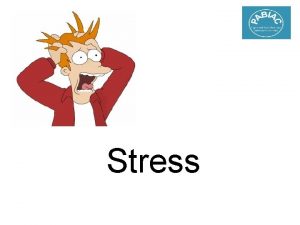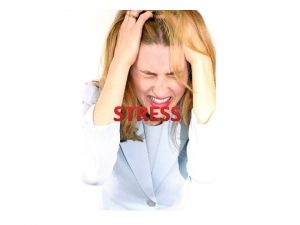Stress Health Miss Kilker Stress Defined STRESS The















- Slides: 15

Stress Health Miss Kilker

Stress Defined • STRESS = The body’s and mind’s response to a demand • STRESSOR = situation or thing that puts a demand on the body or mind (the thing that causes the stress)

Perception – How do I see things? • Perception = the act of becoming aware through the senses – Life experiences make everyone’s perceptions different

Types of Stressors • Environmental Stressors: – Examples: pollution, poverty, crowding, noise, natural disasters, etc. • Biological Stressors: – Examples: illness, disability, injury, etc.

Types of Stressors Continued • Thinking Stressors: – Any mental challenge, ex: test • Behavioral Stressors: – Examples: using tobacco, alcohol, poor time-management, or anything that put stress on your body • Life Change Stressors: – Examples: death of a loved one, getting married, moving, etc.

How does the body respond to stress? • Two Body Systems Respond to Stressors • Nervous System • Endocrine System

3 Stages in Stress Response 1. Alarm – Body and mind go into high alert and the hormone adrenaline is produced and released into the body. This produces the fight or flight response. • • • Breathing speeds up Heart beats faster Muscles tense Pupils dilate Digestion slows Blood sugar increases

3 stages of stress response continued 2. Resistance – Make the decision for fight or flight. You are resisting the stress in this stage. – Endurance levels rise for a period of time and can produce extra strength, speed, etc

3 stages of stress response continued 3. Fatigue – after prolonged exposure to the stressor the body loses the ability to adapt and a tired feeling takes over. Three types of fatigue set in: – Physical – weak and tired muscles causing soreness – Psychological – feeling overwhelmed, worried, depressed – Pathological – body has trouble fighting off illness due to weakening of immune system

Chronic Stress • Chronic Stress = long-term stress with no relief (very bad) – Alarm Stage = become alert – Resistance Stage = eventually become resistant to disease – Exhaustion Stage = body can’t handle resistance anymore, organs and immune system suffer

Eustress vs. Distress • Eustress = Positive – Energizes and helps you reach a goal or accomplish something – Examples: • Getting married • Having a baby • Starting a new job • Distress = Negative – Makes one sick or prevents one from accomplishing a goal – Examples: • Giving a speech • Problem • Guilty

Dealing with Stress • • • Take care of yourself! Exercise regularly Get enough rest Eat right Learn to relax – Breathing exercises – Tension-releasing exercises

Be RESILIENT • RESILIENCY = ability to recover from illness, hardship, and other stressors

Developing Resiliency • Develop your assets: – – – – Support Empowerment Boundaries Productive use of time Commitment to learning Positive values Social skills Positive identity

Other helps • Change your attitude: – Use positive self-talk – Be confident about yourself – Don’t worry about things out of your control • Manage your time: – – List and prioritize Know and set your limits Be organized Make a schedule
 It is a collection of well-defined objects
It is a collection of well-defined objects Process of health education
Process of health education Hát kết hợp bộ gõ cơ thể
Hát kết hợp bộ gõ cơ thể Slidetodoc
Slidetodoc Bổ thể
Bổ thể Tỉ lệ cơ thể trẻ em
Tỉ lệ cơ thể trẻ em Gấu đi như thế nào
Gấu đi như thế nào Thang điểm glasgow
Thang điểm glasgow Hát lên người ơi
Hát lên người ơi Các môn thể thao bắt đầu bằng tiếng nhảy
Các môn thể thao bắt đầu bằng tiếng nhảy Thế nào là hệ số cao nhất
Thế nào là hệ số cao nhất Các châu lục và đại dương trên thế giới
Các châu lục và đại dương trên thế giới Công thức tiính động năng
Công thức tiính động năng Trời xanh đây là của chúng ta thể thơ
Trời xanh đây là của chúng ta thể thơ Mật thư tọa độ 5x5
Mật thư tọa độ 5x5 101012 bằng
101012 bằng
















